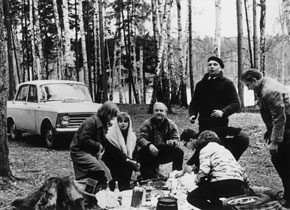
IJUL’SKIJ DOŽD’
(July Rain / Pioggia di luglio, URSS/1966) R.: Marlen Khoutsiev. D.: 107'. V. russa
[Pioggia di luglio] T. int.: July Rain. Scen.: Anatolij Grebnev, Marlen Khoutsiev. F.: German Lavrov. M.: Bulat Okudžava. Scgf.: Georgi Kolganov. Mus.: Jurij Vizbor. Su.: Boris Vengerovskij. Int.: Evgenija Uralova (Lena), Aleksandr Beljavskij (Volodja), Jurij Vizbor, Aleksandr Mitta, Alla Pokrovskaja. Prod.: Mosfilm 35mm. D.: 108'. Bn. Versione russa / Russian version Da: Kansallinen Audiovisuaalinen Arkisto
I personaggi di Khoutsiev amano il loro paese e continuano a crederlo unico, nella convinzione di vivere in un'utopia realizzata, malgrado le ferite ancora aperte: il terrore staliniano, la guerra, che talvolta la loro mente confonde. Ma a risaltare è prima di tutto il loro movimento, che si tratti di Dva Fëdora (I due Fjodor), di Mne dvadcat' let (Ho vent'anni) o di quest'ultimo film. Potranno sapere o meno dove stanno andando, come la protagonista di Ijul'skij dožd', ma comunque si muovono, cambiano: a riprova di un'insoddisfazione, di una ricerca. Sono agli antipodi dei personaggi del cinema dei 'grandi eroi'. Il loro movimento si incrocia con quello della macchina da presa. Sui titoli di testa, un
lungo carrello laterale segue con insistenza la donna nelle vie di Mosca, e lei si volta verso l'obiettivo con infastidita curiosità. Il cinema del disgelo fu anche una liberazione della macchina da presa, a lungo immobilizzata all'altezza dei protagonisti. Le capitava di spiccare il volo, a volte con magniloquenza, ma qui lo fa in modo ben più deciso. Film apparentemente gemello di Ho vent'anni, Ijul'skij dožd' è segnato dal disincanto, come ricorda lo sceneggiatore Anatolij Grebnev: "Alla fine degli anni Sessanta, sentivamo il rischio dell'indifferenza. Parole che pochi anni prima erano ancora vive e nuove stavano perdendo valore, andavano scomparendo. Gli ideali per i quali alcuni avevano sofferto si stavano tramutando in moneta di scambio nella vita quotidiana di altri. Insomma, ciò in cui credevamo si cancellava da sé davanti ai nostri occhi". Nelle ultime immagini, quando i personaggi del film sono già scomparsi, alcuni giovanotti restano ammutoliti davanti a una riunione di veterani. I reduci cantano la marcia verso Berlino dell'Armata rossa. Khoutsievne parlò con Giovanni Buttafava: "Amo particolarmente il finale con il raduno dei veterani della guerra vicino al Teatro Bol'šoj. Avevo notato quasi per caso quegli incontri periodici, che nessuno aveva pensato di filmare. Decisi di non dare ciak, di girare quasi all'impronta: le comparse raccolte non sapevano quando la macchina di presa li riprendeva e quando no. Ho deciso, visto il risultato, di non mescolare quel materiale nella storia, ma di lasciarlo così, integro, come una digressione lirica" (Giovanni Buttafava, Aldilà del disgelo, Ubulibri, Milano 1987). Forse è stato per il peso della storia che Khoutsievha preferito allontanarsi dalla creazione e dedicarsi all'insegnamento. Ma i suoi film restano.
Bernard Eisenschitz
Khoutsiev's characters love their country and continue believing it is unique, in the conviction that they live in utopia, despite the still open wound: the Stalinist terror, the war, at times are confusing. But standing out above everything else is the fact that they move around, whether it is Dva Fëdora (The Two Fedors), Mne dvadcat' let (I Am Twenty) or this latest film. They might know or not know where they are going, like the woman who is the main character of Ijul'skij dožd', but they move around anyway, they change, proof of dissatisfaction and of searching. They are the antithesis of cinema's big heroes. Their movement is matched by that of the camera. On the opening credits, a long dolly shot insistently follows the woman down the Moscow streets and she turns towards the camera with irritated curiosity. The cinema of the thaw also liberated the film camera, which for a long time had been fixed on the actors. The camera would take flight, at times pompously, but here it does so much more deliberately. Seemingly the twin film of I'm Twenty, Ijul'skij dožd' is marked by disenchantment, as remembered by the scriptwriter Anatolij Grebnev: "At the end of the Sixties we felt the risk of indifference. Words which a few years before were alive and new were now losing their meaning and disappearing. The ideals that people had suffered for were being converted into money in the daily life of others. So, everything we believed in was being wiped out in front of our eyes". In the final frames, when the characters of the film have already disappeared, some young people remain, speechless, in front of a meeting of veterans, who are singing the Red Army's march towards Berlin. Khoutsiev spoke about it with Gianni Buttafava: "I particularly love the ending with the gathering of veterans near the Bolshoi Theatre. Almost by chance, I noticed those periodical meetings, which nobody had thought to film. I decided not to start the action but to film it in the moment: the extras did not know when they were being filmed. On seeing the results, I decided not to mix that material with the story, but to leave it as it was, intact, a poetic digression" (Giovanni Buttafava, Aldilà del disgelo, Ubulibri, Milano 1987). Maybe it was because of the weight of history that Khoutsiev preferred to distance himself from creation and dedicate himself to teaching. But his films remain.
Bernard Eisenschitz

Tariffe:
Aria condizionata
Accesso disabili
Tel. 051 522285











